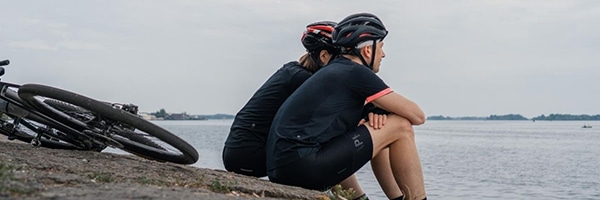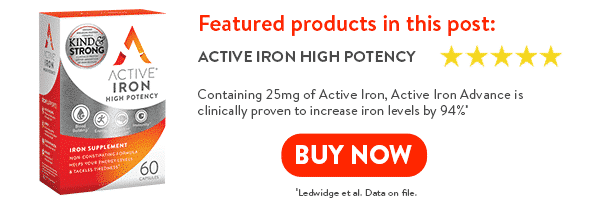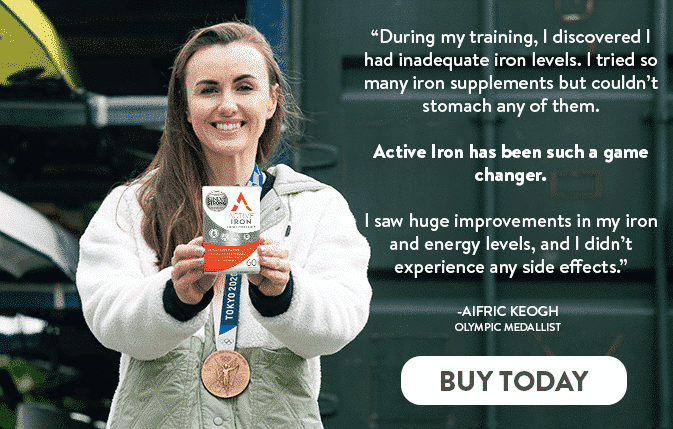Iron is essential to your health and well-being. It plays a vital role in supporting your immune system and helps move oxygen around the body. A lack of iron can cause a host of issues from fatigue to loss of energy and concentration.
However, with today’s busy lifestyles, getting enough dietary iron can sometimes be a challenge. Vitamin C is proven to aid the absorption of iron and so consuming both together is often recommended.
In this post, we cover all you need to know about iron and vitamin C, including the following:
- Benefits of vitamin C and iron
- Foods high in vitamin C and iron
- How to increase iron absorption
- Iron and vitamin C supplements
The Relationship Between Vitamin C and Iron Absorption
How do vitamin C and iron work together? Simply put, the combination of iron and vitamin C helps your body to absorb more of this vital mineral.
Dietary iron comes from two main sources. Haem iron is found in animal foods such as red meat, chicken and fish. And non-haem iron is abundant in plant-based foods, including whole grains, beans, fruits and vegetables.
Non-haem iron tends to be more easily absorbed by the body than animal sources of haem iron.
Vitamin C helps the body to dissolve and absorb iron. Drinking a glass of orange juice with your steak, or drizzling lemon juice over salads will help to increase your iron absorption. But that alone is unlikely to be enough.
Nowadays, our hectic lifestyles can make it difficult to get sufficient iron from our diet alone, and many people do not realise that some daily habits like drinking tea or coffee after meals can inhibit iron absorption. Iron supplementation can be a convenient way to ensure your body gets enough iron.
If you take an iron supplement that needs to be converted into the correct form for absorption, then taking a vitamin C supplement will increase absorption. Drinking a glass of orange juice or similar at mealtimes is not enough. However, Active Iron is in the correct form for absorption and travels protected in its protein matrix to the lower gut where it is absorbed, and so a vitamin C supplement is not needed when you take Active Iron.
Should You Take Vitamin C and Iron Together?
Eating vitamin C and high-iron foods together is perfectly safe. Experts suggest that the source of vitamin C doesn’t impact the amount of iron absorbed. So, supplements work just as well as eating lots of foods rich in vitamin C.
However, some people find it difficult to tolerate the high doses found in some vitamin C supplements. In a few cases, it can cause nausea or diarrhoea.
For some people, iron and vitamin C supplements cause no issues. The benefits of getting enough iron and feeling full of energy and zest outweigh the low risks involved.
Alternative Ways to Support Iron Absorption & Ensure You Get Enough
Eating high iron and vitamin C foods is the number one way to support iron absorption. Later on, we identify what foods to include in your diet to maximise vitamin C and iron absorption.
Just as important is knowing what foods to avoid and when. As we have seen, drinking that cup of tea or coffee after your meal may adversely affect iron absorption. Similarly, eggs, wholegrain cereals, and dietary fibre can also impact the body’s ability to absorb iron. You don’t have to eliminate these foods altogether. Just have your cuppa between meals instead.
Some studies suggest that calcium also hinders iron absorption. If you want to increase iron levels, it’s worth considering avoiding eating calcium-rich foods (milk, cheese etc.) with high iron foods.
You are currently viewing a placeholder content from Default. To access the actual content, click the button below. Please note that doing so will share data with third-party providers.
Foods High in Vitamin C and Iron
We have already identified sources of dietary iron, but what about foods high in vitamin C and iron? Fruits and vegetables are the best sources of Vitamin C. Here are some food choices that will tick both boxes at once.
- Spinach – this superfood supplies an abundance of iron and vitamin C in one power-loaded hit.
- Broccoli – eat raw in a tasty salad and score highly for both iron and vitamin C.
- Leafy greens – cooked kale or Swiss chard contain high levels of iron plus a good dose of vitamin C.
- Potatoes – the humble potato also packs a punch with lots of iron and vitamin C. Best served with the skins on as this contains the most nutrients.
You could also consider pairing vitamin C-rich sources with high iron foods. Why not add delicious, chopped strawberries to your oatmeal breakfast? Combine sweet red peppers with spinach leaves and a lemon vinaigrette for a nutritious meal on its own or to accompany red meat.
The options are almost endless, so let your culinary juices run wild.
Conclusion: Iron and Vitamin C
When it comes to health and wellbeing, there is no doubt that iron and vitamin C make a powerful combination. This is especially so if you are a vegetarian or follow a plant-based diet. Eating iron and vitamin C together will increase non-haem iron absorption, which is harder for the body to do on its own. As part of a balanced diet, consider incorporating foods high in vitamin C and iron to enhance your health and wellbeing.
If you find it hard to get enough iron from diet alone, then Active Iron supplements could be the answer. They are also a good option if you want to maintain your iron levels.
Our ground-breaking iron supplements are clinically proven to enhance iron absorption. As Active Iron is released lower in the gut, at the site of natural iron absorption in the body, the DMT-1, it does not rely on Vitamin C for absorption. Active Iron is kind enough to take on an empty stomach, is clinically proven to provide better absorption of iron than other oral irons on the market*, and fewer unwanted side effects such as constipation, nausea, and reflux, due to its gentle nature on the stomach.
*Wang et al. 2017, Acta Haematological, 138: 223-232



